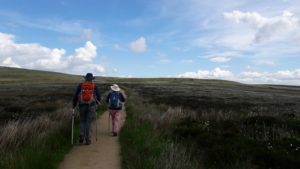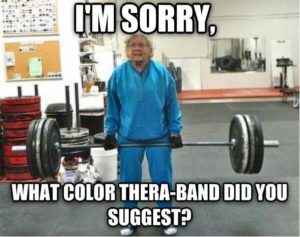
What else is retirement for?!
Following on from this podcast I listened to recently (a BMJ interview with Scarlett McNally and Muir Gray, orthopedic surgeon and Public Health doctor, on Exercise in Old Age), I thought it might be nice to read the actual document it was based on, and maybe try to summarise it. Everyone can listen to the cast, but not a whole lot of people are going to pay £23 to read a 4 page document…but information access is a topic for another day.
So – what did the analysis say?
Well – the headline of the whole thing was this:
Dramatic loss of physical ability is NOT inevitable in old age.
Let’s look at that another way – saying that you can’t do something because you are getting old is a fallacy. A myth. Losing fitness through age is NOT inevitable.
Which is really good to know.
Dr McNally goes on to point out that as we get older (from the age of 30! – so I include myself in this), the biological processes of ageing begins.
This means reduced acuity of eyesight, hearing, resilience, skin elasticity etc.
However, the loss of fitness is NOT a biological certainty.
She continues to talk about disease and co-morbidities (having more than one thing wrong with you at a time… like having Heart disease AND COPD AND diabetes at the same time) this is because when older segments of society are studied greater the number of illnesses are seen. It seems that with the continuing interest in genetics and gene expression that there is widespread belief that illness in old age is inevitable and genetically predisposed. However, she points out that genetics are a less important factor (about 20%) than an insidious loss of fitness in determining modern disease in later life.
Interestingly, once illness takes hold – fitness almost immediately takes a nose dive, which is a shame as the Academy of Royal Medical Colleges have said that at ANY age, with ANY combination of health problems, exercise provides a “miracle cure”.
The more co-morbidities a person has, the more important it is to have strength, stamina, suppleness and skill. (These ALSO improve fitness and reduce the risk of dementia, both at midlife and into 70s and 80s.). It is not the ill-health of the person that leads to the necessity of social care, but rather, but the loss of ability through inactivity.
In fact, one of the most fascinating points in the whole paper was this: People in their 70s with below average ability (measured as “chair rise” time) who improve this by 25%, to the average speed of those in their 60s, experience a reversal of a decade of decline.
Actual turning back of the clock. Getting younger – because they gained the ability to exercise! Unreal.
So – It IS possible to combat the effects of ageing – by increasing physical, mental and social activity, thus reducing the need for social care.

Pet peeve…. giving out therabands when this could well be the solution
If we think for a moment about care in hospitals, intermediate care and care homes, all patients should be encouraged to move more frequently. Falls, however, are seen as an adverse event – and rightly so – but this means that the “magic bullet” of exercise is frequently sacrificed in order to be risk averse and not be seen as a failing and dangerous facility. Should we be thinking more about movement in these situations and locations? This would mean a huge increase in the need for staff, which we don’t have, which in turn would mean more money, which we don’t have. And also, it needs people to WANT to exercise. A difficult combination indeed.
People suffering long term conditions such as diabetes, COPD and heart disease tend to mistakenly believe that exercise will make it worse, whereas the opposite is in fact true. Too much is invested in polypharmacy while activity and rehab are overlooked. It is easier to pop a pill than it is to actually get up and do something, despite the fact that exercise costs nothing and is likely to have a greater effect.
I’m going to leave with a reiteration of the point of all this, and a direct quote from the paper as I think it’s pretty damn important, and is probably something I’m going to revisit in a few more blogs…
Functional decline and the need for social care are NOT inevitable consequences of ageing.
“For people who fear reduced independence, the solution is not to hope for a quick exit, but to do enough activity everyday, no matter what the diagnosis.”
Powerful stuff. Don’t you agree?
To give yourself the gift of better health, fitness, strength and mental resilience – throughout your whole life – get in touch and we’ll get you started on your Personal Training journey.
Let us help you #MoveYourBody to get you #FitForLife





